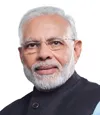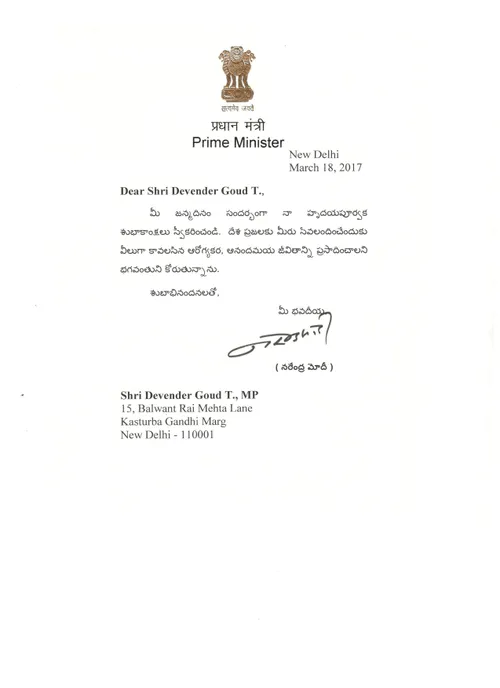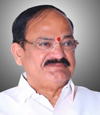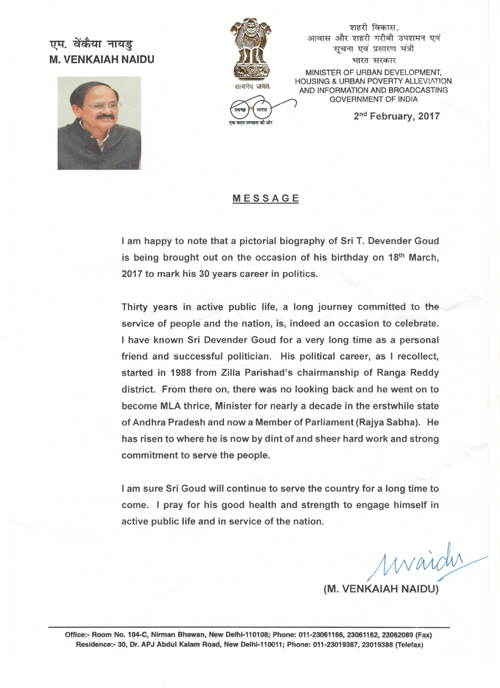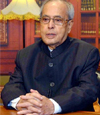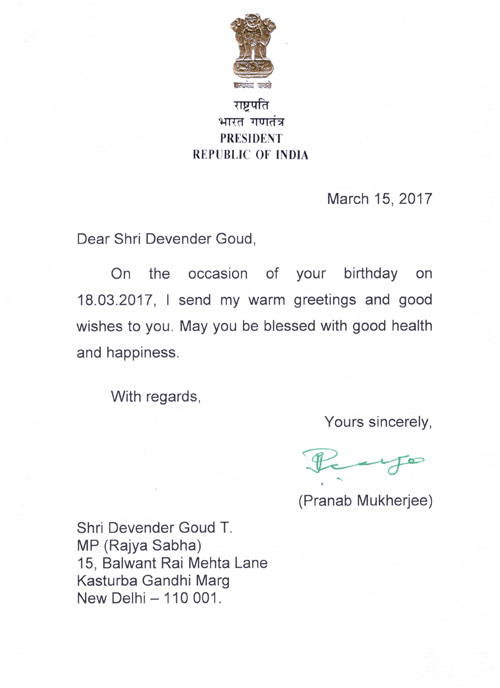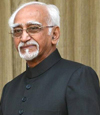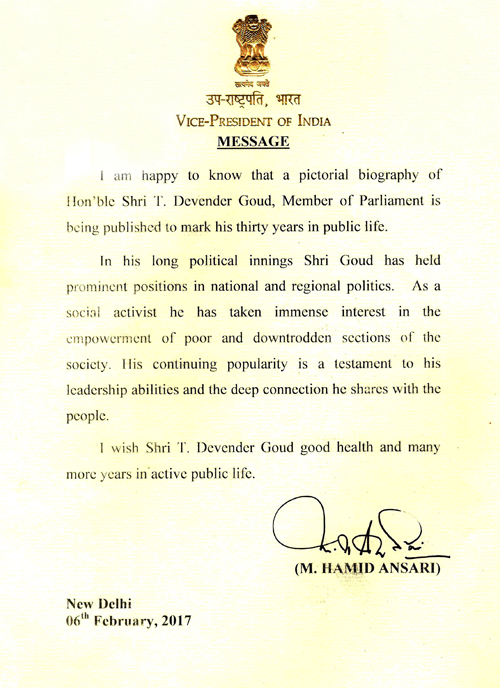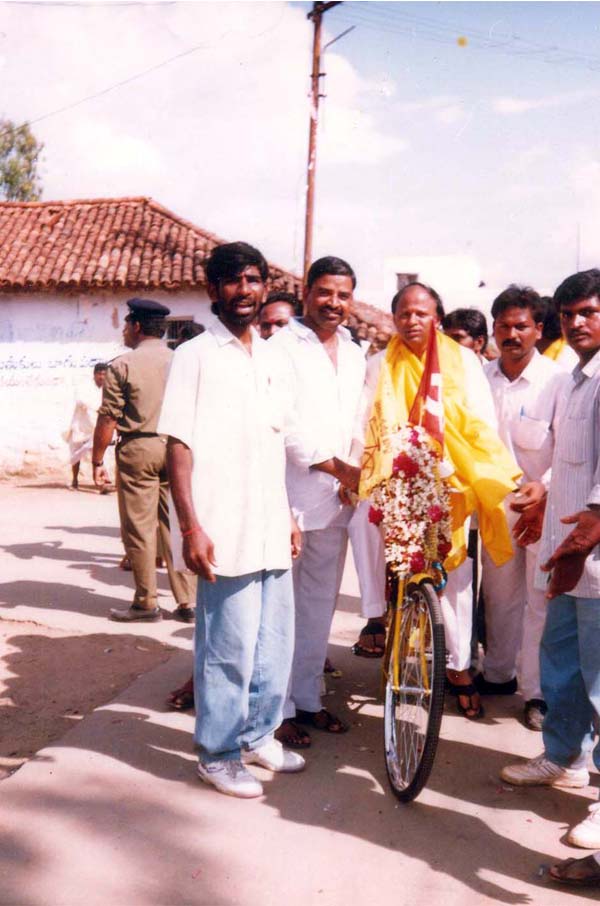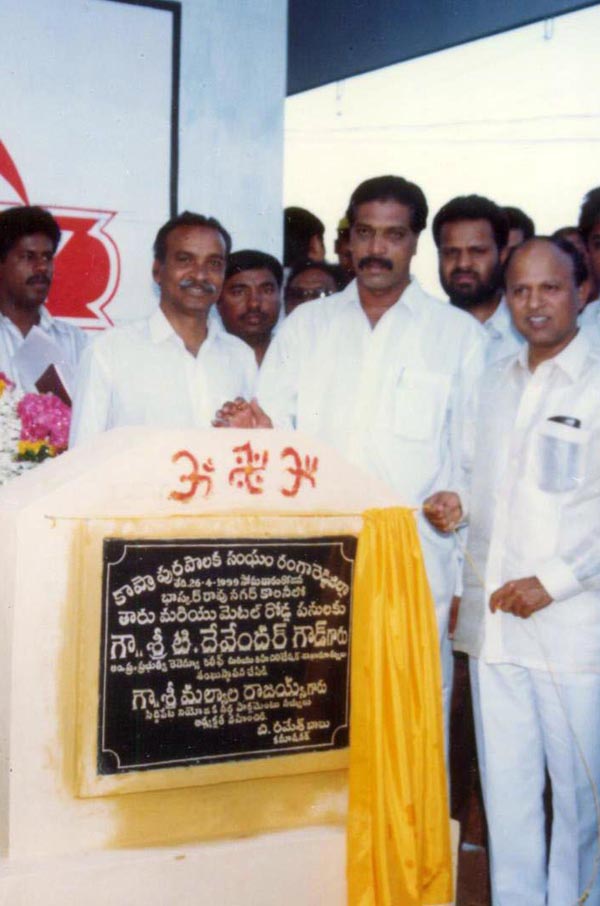Biography
Profile
Sri Devender Goud was born on March 18, 1953, at Tukkuguda village of Maheshwaram mandal in Ranga Reddy district of Telangana State. Sri Sayanna Goud and Smt Sattemma were his fortunate parents.
Sri Devender Goud’s penchant for leadership became manifest at an early age as he became president of Dharmavant college in Hyderabad while studying his intermediate course.
He did his graduation from Bhadruka College of commerce. With deep understanding of social issues and comprehensive awareness on contemporary politics., Devender Goud earned reputation as an intellectual as also a good human being.
As a representative of the poor and downtrodden sections he strived for the uplift of those sections. He was Ranga Reddy district Zilla Parishad Chairman between 1988 and 1993. He led the Zilla Parishad chairmen from the entire erstwhile Andhra Pradesh as the convener of their union. In that capacity he contributed his mite to the State’s development.
He was elected as an MLA for three successive terms in 1994, 1999 and 2004. He was a minister in the State cabinet for ten years and held BC Welfare, Prohibition and Excise, Cooperative, Revenue and rehabilitation, Home and Cinematography portfolios.
He was a member and Chairman of several cabinet sub-committees. As Chairman of the State Administrative Reforms Committee, he introduced several administrative reforms in the State. He was elected as Deputy Leader of the Opposition by the Telugu Desam Legislature Party between 2004 and 2009.
He raised several issues of public interest and won acclaim from one and all. Sri Devender Goud was elected as a Member of Rajya Sabha in the year 2012.
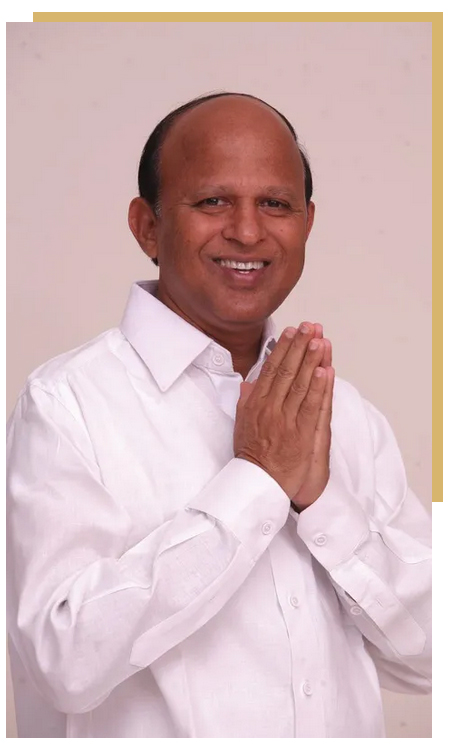
“People are the masters”
None can ever intervene with the passage of time. Time flows on and on without any end. It will keep on marching towards the future. The point to ponder is how a person adapted himself to changing times and contributed to the development of the society.
A person may give priority to himself and his family’s development, but he has responsibilities that are beyond the family. There are no boundaries around a man. Nobody should lead a constricted life with self defined boundaries. In every field we will find great personalities that have sacrificed their lives for the sake of humanity. The unprecedented development of the society became possible because of the relentless research on a wide array of subjects ranging from cure to disease to cosmology.
Humanity came to enjoy innumerable niceties as a result of these researches.Today, India is at an advantageous position with youth occupying most part of its 125 crore strong population, which constitutes sixth of World Population. India has a golden opportunity in its hands. If proper skills are imparted, our youth could prove to be a national asset. They can be useful to the humanity of the World. India remained backward and poverty stricken as it could not catch up with the industrial revolution. As a nation, we should make the best use of revolutionary technology available to us.
The benefits of the technology should reach all sections of people. The country is generating a lot of wealth. But most of the wealth is being held by a very few hands, resulting in a economic disparities between the rich and the poor. As a result eradication of poverty remains a distant dream. This does not augur well. This could lead to many social problems in future. Economic disparities can be ironed out only when we take recourse to inclusive growth.
India, as the largest democracy, has several institutional insufficiencies. Policies and plans to eradicate illiteracy, ill health, poverty, unemployment and other problems were not given effect to in a committed manner.
Problems grew wider and wider because of faulty prioritization over long term and short term problems of the people. Issues like quality education to the poor, better medical facilities and employment are no more ranked top on the priority list. Instead of treating as human beings with constitutional rights, people relegated as mere voters and top priority is being accorded to schemes that fetch votes and that help build personal reputation. The spirit of democracy is being muzzled as only few political parties and families monopolize the political system. Political parties are not at all hesitating to exploit caste, religion and various kinds of sentiments for the sake of votes.
The basic tenets of democracy are being defeated by the day’s political parties. It has become a common practice to lure voters with impracticable promises, distribute money and liquor, intimidate and offer various kinds of other inducements to loot votes. Soon after coming to power, political leaders are taking resources, that should otherwise belong to the people, into their grip. Public representatives are looking for means to earn many folds more than what they have spent in elections. The agenda of political parties always revolves around elections. Corporates are wielding total control over political parties. Once upon a time great ideologues used to be the backbone of political parties. Now their place has been usurped by the ones that can provide funding to parties. Upper castes and affluent sections dominate the legislatures now.No single caste should be identified as a ruling class. Such identification is against the spirit of democracy. Some political parties are callous to the fact that ours is a composite society with thousands of castes and sub-castes. Social justice remains an anathema for these parties.These unfortunate developments are striking at the roots of our democracy. We should annihilate the influence of money in elections. Institutions like Election Commission should take it upon themselves to bring about reforms that promote internal democracy in political parties and also ensure transparency in their activities. Such reforms are very crucial for the survival of our democracy.
I was fortunate enough to tour several countries and study the conditions prevailing there. When compared with many countries, India is rich in natural resources. Poverty can be driven out of the country if the governments could utilize the country’s precious river waters, forests, minerals and fertile lands for the good of the people. Several countries that became independent along with us are briskly moving ahead on the path of development. But our country has not developed at expected pace. We lag behind in effectively utilizing our human resources. The powers and resources are required to be devolved. The local bodies should be strengthened. That will enable development from the grassroots level. The Gram Swarajya of Gandhiji’s dreams will become a reality.
More than 60 per cent of the country’s population still lives in rural areas. Most of the rural population is dependent on agriculture or crafts for sustenance. We should achieve self reliance in food grains with efficient utilization of our water resources combined with modern technology. The farmers’ income should increase. The children of artisans should be provided education and modernity should be instilled in crafts. The nation is witnessing brisk urbanization because there is no scope of livelihood in villages. This is leading to several problems. Those problems should be resolved scientifically.
Equal opportunities to women still remain a far cry. In many countries gender bias is non-existent. In our country, equality was never accorded to women, who constitute 50 per cent of the population. Women were suppressed and kept aloof from mainstream under the guise of traditions and restrictions. Even today, women are facing gross injustices in the country. Our society is unable to honor their merit and strength. India cannot become a super power without the cooperation of its women. Gender discrimination should become a thing of the past. Women should be accorded equality in all fields. Our women deserve freedom. Freedom should be given to them to choose the outfits that suit their profession and also the liberty to choose their profession. The entire society should vouch for the empowerment of women.
The Chatur Varna system in India dates back to thousands of years. The system caused severe loss to Indian society. Though its effect is slowly fading, the country’s education system is leading other kinds of social disparities. There is a vast variation between the educational institutions that are accessible only to the affluent sections and the institutions attended by the poorer sections. There is a vast difference between the two in terms of educational standards and infrastructural facilities. The children from poor families are not even in a position to attend government schools. This is causing disparity between the thought process of youth belonging to different sections. This is leading to the creation of unseen walls between different sections of the society. If equal educational opportunities are available to all, there will not be disparities in the society. Education should not be turned into a business. We should adapt the education systems that are there in advanced countries. Similarly medical facilities should be equally accessible to all. None should be deprived of medical aid because of he has no money. Modern medicine should become the right of all.
People’s trust in judiciary should be strengthened. Our judicial system should be able to deliver speedy and quality justice to all. Laws should be implemented effectively. The executive, the judiciary and the legislature should act in coordination, as envisaged by our constitution. The three pillars should coordinate with each others to serve the interests of the society. We should review the performance of all systems, bring about improvements to them. Modern practices should be introduced. All systems should be made sensitive to people’s interest. People should shed narrow minded considerations like religion, caste and group. They should get rid of superstitions and think with wisdom and broadmindedness.
Not only the State and Central governments, but also local bodies are getting much revenue from taxes paid by the public and also as a result of the infrastructure developed in the past. The financial resources are required to be expended carefully for public welfare. The poor and downtrodden sections can be uplifted if the resources are spent honestly in a selfless manner. Inclusive growth is possible only with optimum utilization of resources. Newer problems crop up in the process of development from time to time. The problems should be solved carefully.
There has been a spurt in health problems these days due to changes in lifestyle. I am habituated to walking, cycling and Yoga from childhood days. Recently I faced health problems. I could overcome them because of my healthy habits. People in public life should be particularly careful about their health.
As a result of technological revolution, the world has shrunk into a village. The combination of globalization, technological advancement and economic progress has resulted in the rise of hope and opportunities. People belonging to all religions should move forward with harmony. All should strive for peace and prosperity. It is my fervent wish that India should become an equal society sans poverty and economic disparities. I want the democratic institutions of the country should be strengthened. People should hold the reigns of the country. I am confident that people will accept this responsibility. In a democracy the ultimate whistle blowers are none other than the people themselves.
T. Devender Goud
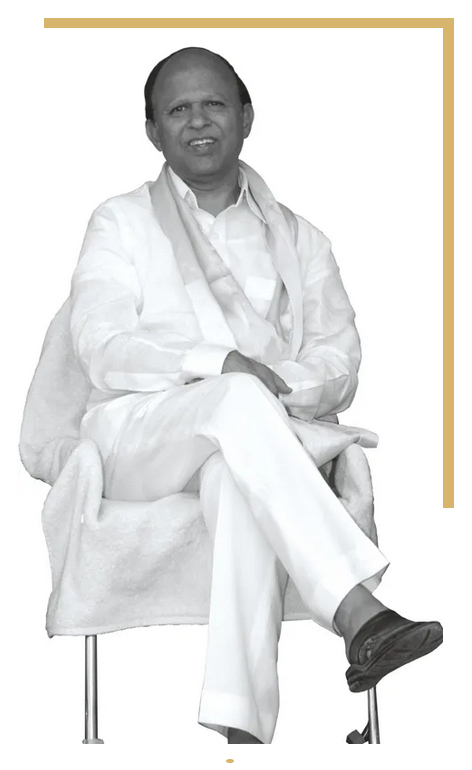
My childhood..
the tender green memories
In a man’s life, what’s more important than the childhood? For any person, there cannot be a greater joy than to recall the fond memories of childhood and the fun of travel in time backwards. I am no way an exception to it.My parents, the land that I strolled as a child and my siblings always linger in my thoughts. The childhood memories and the remembrances related to my native land evoke great happiness. Words are not sufficient to define the experiences from the days of growing together with my friends.
My heart is gladdened when the stream of memories related to childhood happenings, the monkeyshines and pranks come to my mind. The memories are still tender green, as if all that happened only yesterday. As we grow in consciousness we take a closer look at our surroundings and the prevalent social conditions. Just as the childhood memories bring happiness, the social conditions of those days tinge our memories with sorrow too. It is the sorrowful happenings without our intervention that shape our future. Those uncomfortable situations, season our personality.I was born to Smt Sattemma and Sri Sayanna on the 18th of March, 1953 at Tukkuguda village, in Ranga Reddy district. We were seven children altogether. I am younger to three elder sisters and an elder brother. I have an younger sister and an younger brother too. It’s a big family and truly brimming with love and affection.My village… Tukkuguda. It is located just 18 kilometers away from the historic city of Hyderabad. During my childhood days, development was a far cry in our village. There were no facilities for education and no health amenities. There was not even a kuccha road in our village. Kerosene lamps were the only source of light at night. Not even barest medical facilities were there. The economic life of all people was almost similar. That means you cannot segregate people as the landlords, the rich and the poor. The lives of all the village inhabitants were similar. All suffered the same hardships. All belonged to the same community called Poverty.There were some farm lands here and there. But mostly the entire village was dependent on the neighboring forest for its livelihood. At the dawn almost all the villagers used to venture into the nearby forest with sickles in their hands. They all used to cut grass from the forest and make bundles of it. Once in two days they used to load their carts with bundles of grass and sold it off in the city. The household was managed with the few rupees fetched by selling the grass. My father became a grass contractor as he knew a little bit of reading and writing. My mother Sattemma used to take care of our home. My elder brother was very focused on his studies. So was I. I also used to long to accompany my father to the forest. Father had not studied much. He was literate enough to read newspaper. He used to mention before others that one day his children will grow up to become educated and would get into big jobs.I really don’t remember the conditions that prevailed in our surrounding villages in those days. In my village, there was none ambitious about education. It was more a result of lack of awareness than an outcome of poverty. Our village had a population of 1500. Nobody had ever thought of building a school at the village. My father was the only person at my village, who had the strong ambition to educate his children. The village school was run at the Hanuman temple. I vividly remember those days. By 8am in the morning all my fellow students used to assemble at the Hanuman temple. The temple was a bare structure with a roof on four pillars. We used to leave half of the space for the deity and the rest of the area for our studies. Thus it’s a temple and a school too. Had our teachers not taken special care to impart good education to us, probably nobody would have known about my village even today. In my village there were neither affluent people, wealth accumulation, nor there was any awareness. The natives that managed to study despite all the odds brought recognition to the village. Our teachers used to inspire us by narrating the stories of Indian mythology and the Puranas along with folk tales, fables and moral stories.
The villagers used to collectively celebrate the Batukamma festival. All used to climb the hills to fetch flowers for the festival. We also used to celebrate Moharrum, popularly known as Peerla Pandaga. The joy of children knew no bounds on the festival of kites. During holidays all of us would gather at the village stream where we used to enjoy no holds barred fun and frolic. All the shouts of the elders fell on deaf ears. We grew up with much freedom.
I used to derive boundless joy watching the dawn. The chirping of the birds that flew in groups used to fill my heart with much of happiness. I always thought– how great it would be if human beings too could move around freely without the chains of fears, anxieties and slavery.
We faced many bitter experiences while growing up. The lack of medical facilities was particularly alarming. There was none to rescue when ill health struck. My mother fell sick one day, when I was around ten years old. Days and weeks passed by, but there no improvement in her condition. A local doctor came to our home one day. He announced that her disease has grown complicated. Hearing him say this, all my family members wept aloud in unison. The doctor however, did not leave my mother in the lurch. He offered to take her to Osmania Hospital. Probably my mother was the first person from our village to be taken to city for medical treatment. Had that gentleman not taken my mother to Hyderabad, probably we would have lost her forever. After growing up, I tried to locate the person that had saved my mother’s life. All my efforts to trace him went in vain.
After studying at Tukkuguda village school upto 3rd standard, we shifted to Hyderabad’s old city for further education. Having passed out from school I did my intermediate education from Dharmavant College. I did my graduation, B.Com, from Bhadruka College located in Kachiguda area. While studying intermediate, I was elected as president of the students union. I was an active participant in college politics. I was drawn towards politics at an early age and my interest in politics grew stronger after my maternal uncle was elected as village sarpanch. That’s the reason I couldn’t concentrate entirely on my studies, like my elder brother. My elder brother Yadayya became a medical doctor. He was the first person from my village to study that high. My father was keen that I too should become a doctor. But the destiny had it otherwise. However, I and my younger brother completed our graduation.
We suffered a lot in the pursuit of our studies. To spare the children of my village from the same troubles, I got a government school built at Tukkuguda village during my stint as Zilla Parishad Chairman. For a long time many children from my village, aspiring English medium education had to go to neighboring villages. After becoming a minister in the State cabinet, I built an English medium school named Devendra Vidyalaya with my own personal resources. At present 1450 students are studying at Devendra Vidyalaya. I derive great satisfaction over the fact that the school is providing free education to poor and needy students who comprise one third of the school’s total strength. As a minister in State cabinet, I got a government Residential School for Backward Class students built at the village. As there was no government land for the construction of the school, I donated 10 acres for the residential school. I am still haunted by the memories of the days when my village had no educational and health amenities. That’s why I don’t want the children of my village to suffer like me. As far as medical facilities are concerned, there are both a government hospital and private clinics at the village. But still people have to go to Hyderabad for better medical treatment. I have a strong aspiration to see that this handicap is overcome.
***
Family
Balancing of responsibilities
Family is the foundation of our society. It is the responsibility of the family head to extend all possible support to the other family members. By the time I entered politics, I was already the father of three, all boys. Notwithstanding my busy political engagements, I made sure that sufficient time, love and care is always given to them. As a father, I gave them good education. They have finished their higher education. Today all of them are happily married. I must acknowledge my wife’s diligence, in nurturing them very well. Without her support my strivings for the family’s welfare would have been incomplete. Vijayender is the eldest of my three children. Vinayender is the second and the youngest is Veerender. All three sons, daughters-in-law and all the grandchildren stay together. It gives me and my wife great satisfaction to see them all together.
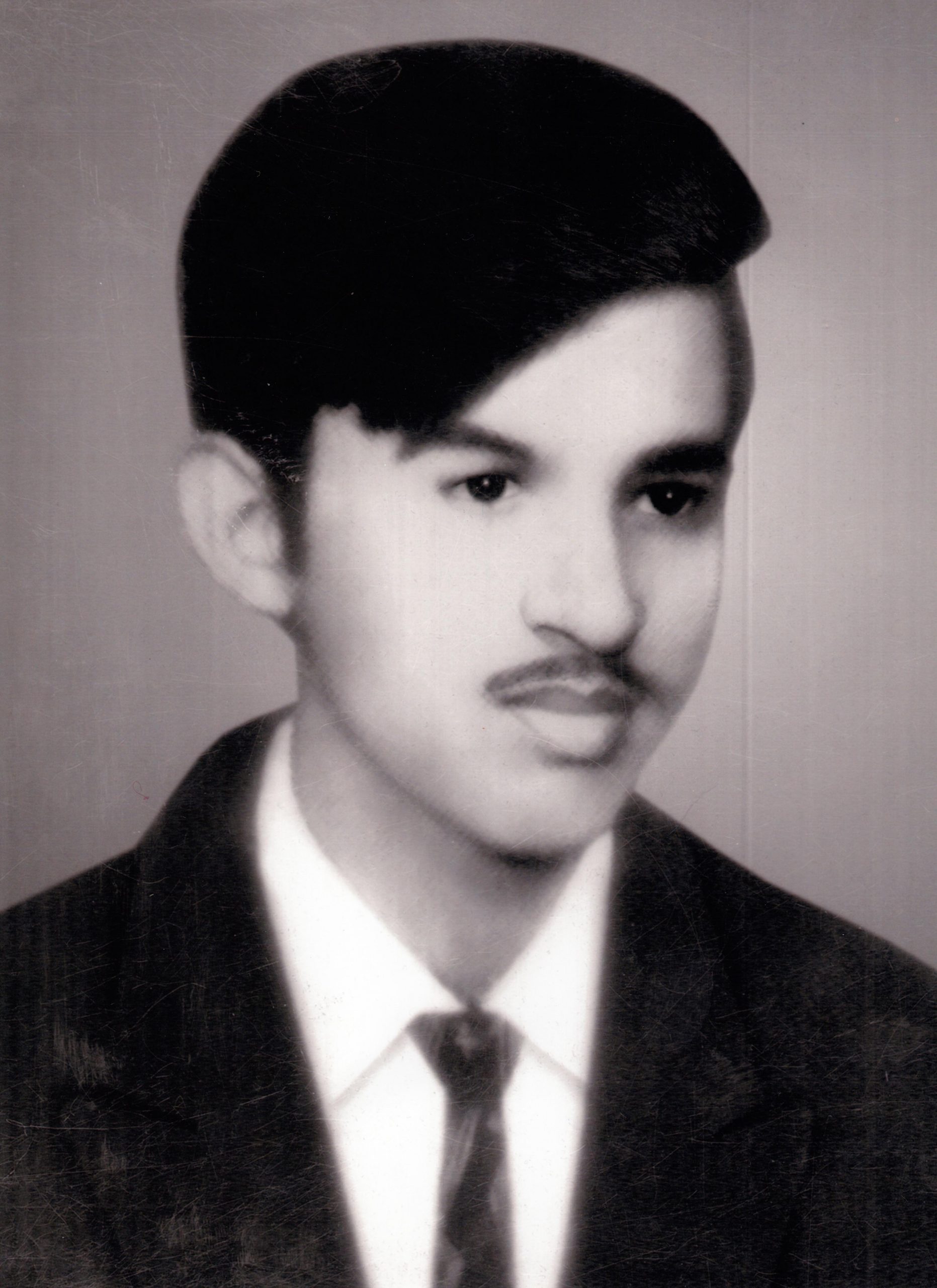
A never ending journey
The first step in politics and association with NTR and Chandrababu Naidu As my political life moves on like a never ending journey, the first steps I took in politics remain a sweet memory. Though located very close to the State capital Hyderabad, my native village Tukkuguda and surrounding villages showed not even traces of any political awareness. I hailed from a socially and economically backward section of the society. They were times when certain sections and communities seized themselves with political supremacy against the basic tenets of democracy. The sections I represented were the ones that had taken for granted on their social and political inferiority. My emergence on the political horizon from such disadvantageous background surprised many.In those days, Congress was ruling the roost. As there was no effective Opposition, the diverse factions from within the Congress used to act as the Opposition. Having keenly observed the rot ushered in by the Congress party’s polluted politics, I wanted to stay away from political arena. I wanted to take up some business or find some good job for myself. At that juncture, politics in the erstwhile undivided Andhra Pradesh state took an unexpected turn. Sri N.T. Rama Rao, the matinee idol entered the political firmament by launching the Telugu Desam Party in 1982. Within 9 months after its formation, the party won the 1983 election with overwhelming majority. I was attracted to the ideals of Sri N.T. Rama Rao. Particularly his commitment to the welfare of the poor and downtrodden sections was flawless. This drove me to join the Telugu Desam Party without any hesitation or second thought. In a very short time, I could draw the attention of Sri Rama Rao through my good work. Notwithstanding the numerous pressures from different quarters, Sri Rama Rao chose to field me as Telugu Desam party’s candidate in the first ever direct election to the post of Ranga Reddy district Zilla Parishad Chairman.
Convener of ZP Chairman
Decentralization is the only salutation for overall development
I won the direct election to the post of Zilla Parishad Chairman with a big margin. As a ZP chairman I visited every village in Ranga Reddy district. This gave me the opportunity to witness people’s problems from close quarters. I made use of the opportunity to directly interact with the people. I saw the problems they faced. I realized the gross neglect of the education sector by the authorities. I dedicated all my energies to strengthen the educational infrastructure and thus contribute to the improved attendance at Zilla Parishad schools. The education sector in the district got a boost as I took initiatives to solve the teachers’ problems also. Very soon after I became the ZP Chairman political equations in the State drastically changed. In the elections held to the State legislature in 1989, the Congress party won. As soon as the party came to power, it began discriminating against the ZP Chairmen and disregarding their powers as a majority of them belonged to the Telugu Desam Party. We had to fight with the government at every step for funds and powers. This forced the ZP Chairmen to come together in their fight for their rights. Though there were many senior leaders among them, the Chairmen elected me as their convener. That was big turn in my political career.
I made the best use of the opportunity as the convener of ZP Chairmen. This offered me scope to travel beyond Ranga Reddy district. I toured the entire State. I studied the problems of the people. I could shed light on the restrictions over the powers of local bodies. I participated and addressed workshops, seminars and meetings held in all the three regions of the erstwhile AP State. With a clear cut action plan, ZP chairmen under my leadership fought with the State and Central governments for their rights. We also mobilized public support. Our struggle contributed to the return of the Telugu Desam Party in 1994 elections.
It was my good fortune that I got the chance to work for the people with honesty and courage. I always considered service to people as service to divinity. I did not compromise anywhere. I got closer and closer to the people by serving them in coordination with numerous public representatives and government officials. I always derived great satisfaction in solving challenging problems. The support and encouragement I received from Sri NTR initially and subsequently from Sri Chandrababu Naidu stood me in good stead. The cooperation from the party colleagues remains simply invaluable. All these developments only added up to prove that with dedication and hard-work common man like me also can succeed in public life.
*
My stint as a Minister
Leaving behind my own imprint
Administration is not that easy as it appears. In a democratic set up running government affairs with efficiency and equanimity is an art. Only an efficient leader can motivate the public administration in the course of a right direction. Every government has its own order of priorities. A government without well defined long term and short term goals cannot win public trust. All the available resources, technology and talent should be effectively utilized towards the speedy resolution of people’s problems and also meet their requirements. Necessities will keep on increasing. To meet them, new resources should be created without imposing any burden on the people. All decisions should be taken with long term vision, the likely repercussions and the requirements of future generations should always be kept in mind. Wherever there is scope, people’s participation should be enabled. Shortfalls should be constantly reviewed. For almost ten long years, I served the undivided Andhra Pradesh State as its Revenue and Home Minister. During this period I initiated many administrative reforms. A new work culture was introduced and the change we brought about was considered as an ideal one in the entire country. I derive great satisfaction from the fact that my initiatives as a minister yielded good results.
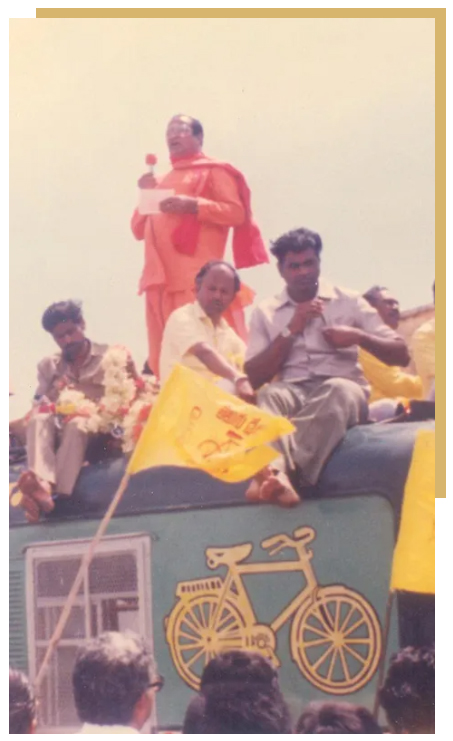
Reforms
– Administrative reformsMACS Act in Cooperative sector
While holding the portfolio as Minister for Cooperation, I got the opportunity to extensively study the cooperative laws. Having studied all the laws, I took initiative towards the enactment of a better and more comprehensive cooperative law called Mutually Aided Cooperative Societies Act (MACS Act). This Act was applauded by all the sections concerned. After we enacted the law, other States in the country and some foreign countries like Sri Lanka and Malaysia also followed suit by making similar laws.
– Revenue Reforms
The introduction of Pattadar Pass Books was a major initiative taken during my stint as Revenue Minister. Pattadar Pass Book is a small document, a bound book, containing all details of the land owned by a person. It is like a title deed. The Pattadar passbook came very handy to the farming community. It eased the process of taking farm loans. By taking up computerization of land records, we brought down property disputes and unnecessary litigation to a large extent.
As Revenue Minister, I took my department closer to the people. I also took initiative towards designing the Computer Aided Administration of Registration Department (CARD). This system is much acclaimed by all. Revenue Codes were also designed during my period.
I can proudly claim that we took successful measures to simply revenue tax collections. We made Revenue department more responsive and responsible. We practically proved to the World that the government can be taken to the people’s door steps through administrative reforms. As a minister, I took initiative in conducting Revenue seminars all over the State. The bold steps I took as Revenue Minister were appreciated by public.
I took keen interest in bringing out a Revenue manual. We were able to make revenue records more accessible to people. Revenue administration was taken to the thresholds of the poor and needy people. I gave a call to my revenue staff to be always accessible to people and be responsive to their needs. I felt very happy when my revenue machinery acted with dedication by responding positively to my call.
We also eased the process of obtaining Caste Certificates. During my period GOs were issued for the allotment of 5 acres of land to toddy tappers and other artisans.
– Reforms in Home Department
I worked as Minister for Home from 1999 to 2004. During this period I took some revolutionary steps that gave a new direction to the overall administration of the State’s Home department. The steps I took offered solace to the people that were vexed by the violence by Naxalites, terrorists and other anti-social elements who were hell bent upon denting the State’s peace and tranquility. There was no thread of connectivity between the police, the Naxalites and the people. Thanks to the efforts I made as Minister for Home, the department became more people-friendly. By giving top priority to problems arising from social and economic inequalities, we were able to prevent unrest and agitation. The number of Naxalites that laid down their arms and surrendered increased. A large number of Naxalites joined the mainstream after giving up their violence. I initiated many steps for the rehabilitation of surrendered Naxalites. This enabled them to start their lives afresh.
Several schemes were introduced to involve police in social service. By doing so, we wanted to project the friendly phase of the policeman’s face.
During my stint, police dealt ISI related activities with iron hand. The policemen effectively guarded law and order. As we effectively implemented the recommendations of Justice Punnaiah commission, the atrocities against SCs and STs also came down considerably. Terrorist related violence abated by 50 per cent during my five year long work as Home Minister.
Fortunately other criminal activities like murders, riots, dacoities and burglaries also came down substantially. Faction violence abated in Rayalaseema and Palnadu regions of the State. We took steps for the modernization of police forces. We provided modern weaponry, communication gadgets and modern vehicles to policemen. Skill updating, reorientation and training of policemen were taken up extensively. Several steps were taken to improve the moral conduct of policemen.
Though the State was lagging in terms of police and public ratio, my cops acted more efficiently in protecting law and order through prevention of crime. During the period of 1999-2004, when I was the State’s Home Minister, the State’s crime ratio was very low when compared with national average. We surged ahead in computerization of police records. All the police stations were computerized. We secured the finger prints of 2 lakhs criminals. We launched ultramodern forensic labs at 8 centers. E-Cops programme was piloted in 4 districts. We made efforts to spread the project to other districts also.
– Maitri Committees
Policing can be made more effective through people’s participation. With the aim of increasing people’s participation in policing, I introduced the concept of Maitri committees in Andhra Pradesh. It was a novel experiment. Maitri Committee volunteers were involved in dealing with traffic, dowry cases, family counseling, control of communal clashes, faction rivalries, terrorist violence, eve teasing and other problems.
With the inputs from Maitri committee members the department of Home investigated and solved many cases. While there were altogether 1444 police stations in the State, 10,734 maitri committees were constituted under their purview.
– Citizens Charter for Police
We introduced Citizen’s Charters at all police stations in the State. This was meant to make police respond to people in a friendly and proactive manner. Receptions were established at all police stations and all the visitors to the police stations were accorded dignified reception. Everyone was offered a seat respectfully and the complaints were taken patiently. People welcomed these steps. Citizen Charter clearly defined services the police could render on matters like crime control, law and order protection, complaint resolution, prosecution, Traffic rules, police assistance and human rights.
– E-Cops project
E-Cops stand for E-Computerized Operations. We introduced E-Cops system to improve police efficiency in the analysis of information, planning, speedy detection of crime, prosecution and other related aspects.
We made use of the Information Technology in a very effective manner to modernize police services. The erstwhile undivided Andhra Pradesh pioneered in the concept of coordinating the entire police network through the E-Cops project. This enabled more efficient functioning of police. A modern system that disseminated vital information to all police Stations came into being. Crime control became easier with this system. In view of the constraints of those days, the E-Cops system was introduced only in 225 police stations in the State. In Hyderabad district 63 police stations were covered. Similarly 35 stations in Visakhapatnam 29 in Vijayawada, 43 in Srikakulam and 55 police stations in Ranga Reddy were covered. Traffic police were also brought under the purview of this system.
– Performance tracking system
A performance tracking system called ‘Intelligence Messengers’ was introduced to analyze the performance and efficiency of the police personnel throughout the State. This new system enabled timely review of police performance as it facilitated instant sharing of data from all the police stations in the State.
– Family counseling centers
As the Home Minister I launched Family Counseling Centers all over the State to solve marital disputes. As a pilot project 153 centers were started initially.
– Policemen trained to be the friends of the people
Special police training centers were launched to inspire police to serve the people better. More than 2 per cent of the budget allocated to the police department was spent on training. Good results were achieved by providing constant training to policemen. Policemen were given people based orientation through these training programmes. Training was given to 36,000 officers at the police academy.
A new police patrolling system called Rakshak was introduced. The patrolling was on par with the police patrolling systems seen in the New York City and in London.
– Grey Hounds
A special police commando unit called Grey Hounds was established by my ministry for the first time in the country. Grey Hounds commandos were trained to participate in guerilla operations, combing operations in deep forests. Along with most advanced training, Grey Hounds were also provided with ultra modern gadgets. The services of these commandos were utilized to enforce law and order and also to quell communal riots. Grey Hounds forces also extended services to the people during natural calamities like floods.
– Forensic Lab
Andhra Pradesh Forensic Science Laboratory became the first ever forensic laboratory to achieve international accreditation. The Forensic Science Laboratory extended services to solve sensational cases from Karnataka, Kerala, Tamilnadu, Maharashtra, Bihar, Uttar Pradesh, Jammu Kashmir and Goa also. Some cases from Great Britain and Italy were also referred to the Forensic laboratory.
– Cyber Crime station
Hyderabad city became the hub of Information Technology industry with the arrival of several global IT firms. In this backdrop the necessity of a cyber crime station was strongly felt. The first ever Cyber Crime Station in Andhra Pradesh launched at Hyderabad on December 23, 2003. Andhra Pradesh became one of the pioneering states in this regard. Special training was provided to the staff posted at the cyber crime station. Most modern gadgets were also provided to the officers.
– Prison reforms
During my tenure as Home Minister many reforms were initiated in jails. Greater emphasis was laid on turning prison inmates into responsible citizens. For the first time ever video linkage was established between jails and courts in January 2001. Andhra Pradesh was the first State in the country to introduce this reform. As a result of this, prisoners that were languishing in jails without trial for years got the opportunity to move out of the confines of prisons. The video linkage was expanded to all the Central, district and also some important sub-jails.
Two central jails with international standards were built at Charlapalli and Visakhapatnam at a cost of Rs 60 crore. Prisoners were given vocational training during their prison term, so that they may return to the outer world to take up new lucrative professions.
– Adult Literacy and Yoga
Adult literacy and Yoga training programmes were launched to bring about holistic transformation in prisoners. Brahmakumaris, Rotary Club, Lions Club, Praja, Asmita, Bala Rakshana Samiti and other organizations were involved in conducting literacy and Yoga programmes in jails. Special programmes were conducted for female prisoners.
***
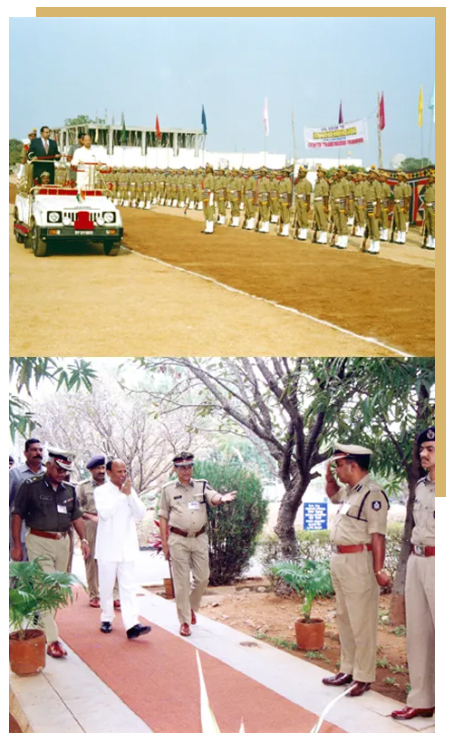
Godavari Jala Sadhana Yatra
Soon after coming to power in the year 2004, the Congress government began works on 26 major and medium irrigation projects under a flagship programme named JalaYagnam. It was proposed to spend 50 per cent of the State’s total plan budget on irrigation. However not even a single major project in the list of 26 projects was meant for Telangana region. Though some medium irrigation projects were proposed for Telangana, fund allocations to those projects were nominal. It was a government conspiracy to loot funds and water. I stood up against the injustice as the Deputy Leader of the Opposition and as the representative of Telangana region. Speaking from several forums, I made appeal to the then Chief Minister to accord priority to the development of irrigation in Telangana region on par with other regions. Both on the floor of the Assembly and also at different outside venues, I argued that river Godavari can be harnessed to provide waters to SriramSagar (State 2) project, Devadula Lift irrigation project, Pranahita-Chevella project and other irrigation projects of Telangana. Given adequate priority to these projects, 120 TMC ft of Godavari water can be utilized to provide irrigation and drinking water to Adilabad, Nizamabad, Karimnagar, Ranga Reddy, Medak, Warangal, Nalgonda and Khammam districts of Telanganga region. I emphatically stated that this will enable permanent drought eradication from Telangana region.
My demand was for the immediate launch of works on Pranahita-Chevella and commencement of works on Devadula project without curtailing its capacity. We made an appeal that river water should be diverted to other regions only after local requirements are fulfilled. But the government remained unheedful to the just demand. Citing various pretexts and technical reasons, the government concluded Pranahita-Chevella project as unviable. At this juncture the Indian Institute of Engineers, Hyderabad, made a presentation listing out the advantages and benefits of Pranahita-Chevella. The Institute organized a round table conference to which all the political parties were invited. The report on the benefits of Pranahita-Chevella was circulated to all the parties. I was among the participants of the round table conference. I brought out the report as a book and circulated it among all the MLAs of the State, so that they may become aware of the subject. I raised the topic about the project in the State Assembly through a special mention. The Institute’s report on Pranahita-Chevella project was presented to the Chief Minister of the day through the Speaker of the Assembly.
As the Leader of the Opposition and as a public representative from a backward region, I could never watch in silence injustice to Telangana. The fact remains that Telangana got everything through struggles only. Nothing ever came to the region unsolicited. As it became clear that the government will not relent until a mass movement is launched with the support of the people of Telangana, I decided to launch a long march called Godavari JalaSadhanaYatra. All the fellow party men extended their support to my initiative. A lot of groundwork was done before launching this movement. Before I plunged into action district cadres of the party were motivated to take a plunge into the movement in right earnest. Demonstrations were held before the Collectorate of each district. We made every effort to convince the government to do justice to Telangana. But the government did not budge.
When all the efforts failed I launched Godavari JalasadhanaYatra from Palavagu area located near Macherial in Adilabad district of Telangana region on January 28, 2006. The foot march went on for 24 days covering 500 kms in 8 districts. The government of the day attributed political motives to the agitation. The ruling party portrayed it as an activity meant to flaunt our presence. Congress leaders held Suddhikaran (Purification) Yatra wherever our march went. They even burnt our effigies. They criticized us as crooked elements out to impede JalaYagnam. The Congress leaders also assured that Pranahita waters will reach people very soon and there was no need of any agitation.
All the Telugu Desam party leaders from the entire Telangana region participated in the Padayatra I led. People turned up in large numbers. At every step farmers, women and people from different sections welcomed me wholeheartedly. At every step people narrated their water woes. In spite of the numerous obstacles, we moved on with public support. This Yatra has great significance in the History of Telangana. The government designs to take away Godavari waters without building any projects in Telangana region were thwarted. People realized the manner in which governments were actively encouraging disparities between regions. As a result of the government’s discriminatory practices, the element of people’s right over river water became integral to the Telangana sentiment. Godavari JalaSadhana Yatra served as a benchmark to the united people’s struggle for their rights.
As a result of our efforts, the government finally changed its stand and agreed to take up Pranahita Chevella project. It is a different story that the rulers of the day utilized the project works as a source of corruption. They had no sincerity to complete the project and solve the problems of the farmers. The project works were divided into different packages and mobilization advances were granted to contractors. Canal works were taken up without starting the head works. Scam worth several thousands of crores took place in the project works. The estimates of the works crawled up from Rs 10,000 crore to Rs 32,000 crore. A project that should have been useful to the people became a boon to the contractors that fund the ruling party’s election campaign.
***
Agitations, Peoples’ moments
Guarding the Public Interest
The Telugu Desam lost power to Congress in the 2004 Assembly elections. As the party had to sit in the Opposition benches in the State Assembly, I was elected as the deputy leader of the Opposition. The party chief Sri Chandrababu Naidu was the Leader of the Opposition. During this period I had to fight with the ruling party of the day both inside the Assembly and also outside. I waged a relentless battle against the rulers that be when they took unilateral decisions that contravened the public interests in general and the interests of the weaker sections in particular. I am thankful to the people for the support they extended in my fight against autocratic ways of the government. My days as the deputy leader of the Opposition, I feel, were a very important phase of my life.
I would like to mention here some of the agitations in which I participated.
As an Opposition we used to pull up the government on the floor of the Assembly over its failure to preserve public interest. As the government failed to respond to our vociferous attacks inside the house, we took our agitations into the people. I led Godavari Jala Sadhana Yatra to expose the government’s lopsided priorities on the irrigation front.
The march to highlight the problems of social welfare hostels was yet another successful agitation we conducted as a responsible Opposition. We took up massive agitations against the State government’s negligent attitude towards social welfare hostels. Through the agitation, we berated the government’s callous attitude towards hostels, as evident from the poor budgetary allocations it made to them. We demanded the government to accord priority to increase budgetary allocations to hostels and thereby do justice to the poor and needy students. As part of the agitation, we sought to spread public awareness on the plight of the students staying at hostels that are in a dilapidated state. The problem of the inmates of hostels without toilets, the heart rending stories of students who died due to snake bites within the hostel premises were also widely publicized by us. To draw the public attention to the problem, we chalked out a program under which we slept on the floor at the hostels. This greatly boosted the morale of hostel inmates.
As a responsible Opposition we pilloried the government of the day over its liberal distribution of thousands of acres of land to special economic zones, while it disregarded the requests made by the poor for 60 sq yd house site. We travelled far and wide to explain facts to the people. I stood in the forefront of the agitations by the poor and needy seeking house sites. As a deputy leader of the Opposition I always strived to take the people’s problems to the notice of the day’s government.
– Agitation against Babli
The Babli agitation, in which I participated with total conviction, deserves to be remembered as an important episode in the history of Telangana. As the government of Maharashtra began construction of the controversial Babli reservoir project, allegedly in a clandestine manner, the Telugu Desam Party notified the same to the then Congress government in 2005. As the deputy leader of the Opposition, I explained to the government about the Babli project and its consequences. The photographs related to the constructions were also presented to the government. Yet the government failed to react. The government argued that Maharashtra was constructing just a check-dam and it would not even cause loss of a single TMC ft of Andhra Pradesh’s river water share. This prompted me and the entire Telugu Desam legislature party to tour the Babli area where the construction was taking place. After returning from the tour, I along with my colleagues submitted a memorandum to the government. Particularly annoying was the episode where-in the Maharashtra police resorted to indiscriminate lathi charge against the Telugu Desam Party leaders at the Babli site. This caused severe public outcry in the 7 Telangana districts. The public outrage was much evident from the outpour of support we received. This stoked among the people the aspiration to protect the interests of Sri Ram Sagar Project command area.
– Striving for the weaker sections
The directive principles of our Constitution clearly stipulate that the governments should strive towards establishing a welfare State. Economic disparities will vanish only when utmost priority is accorded to the welfare of poor and weaker sections who form a preponderant majority of the country’s population. The poorer sections of the society toil hard to generate wealth for the nation. Creation of educational opportunities for their children is a national responsibility. The weaker sections remained deprived of education since the past several generations. Because of the government’s disregard and the official negligence, the children belonging to weaker sections were getting a raw deal on the education front. Once upon a time, the social welfare hostels were the havens of education and they acted as a boon for the downtrodden. But they slowly degenerated into places of neglect and apathy.
The priorities of the government changed with the passage of time. While successive governments gave incentives worth thousands of crores to the industries in the guise of economic development, it began decreasing the budgetary allocations to social welfare hostels. Proper diet and basic amenities eluded the inmates at the social welfare hostels. The conditions at the girls’ hostels were even more pathetic. While there were hundreds of girls at the hostel, they were provided with only four toilets. At many hostels, the students were not even having the facilities for a proper bath. They were thus forced to depend on village ponds and irrigation tanks to have the day’s washing. There are numerous tragic instances where in hostel inmates drowned in the tanks when they ventured into them for a bath.
The Social Welfare Hostels Yatra by me to take the plight of social welfare hostels to the government’s notice attracted much public support. I slept at the hostels along with the hosel inmates to draw the outside World’s attention to the problems. The Opposition parties unitedly stood behind me to question the government about its apathetic attitude. Institutions like the State High court, Lokayukta, Human Rights Commission issued adequate directions to the government.
– House sites for the poor
All the human beings in the World share common emotions and needs. Every person deserves health, justice, Education, Safety, love and belonging. The laws of nature are equally effective on everyone. People begin their day with the sunrise and retire to rest after sunset. However generations socio-economic disparities have resulted in a situation in India where all the wealth is concentrated in the hands of a few, while a vast majority of people do not even have shelter over their head. Crores of people do not even have a small house site on which they can build their own house. Governments of the day are ready to give away thousands of acres of government land to well off sections in the name of industrial development. The same governments refuse to allot a 60 sq yd land for the poor and needy. The number of shelterless poor people is increasing by leaps and bounds.
In the name of economic liberalizations, governments are granting lakhs of acres to unknown companies; while on the other hand, the thatched huts belonging to the poor are being forcefully demolished to pave way for development. This is leading to social unrest. After getting elected as the Deputy Leader of the Opposition in the State Assembly in 2004, I launched an agitation seeking house sites to the poor and needy. I questioned the government’s highhandedness where in poor people are forcefully vacated from the small hutments on the pretext that the land belonged to the government. I am for a law that makes house site a birth right for every citizen.
*****
Political compulsions
Some inevitable hard decisions
It is a cruel fact that the political conditions are always fluid and they do not remain the same always. Politics fluctuate in accordance with changing times and the people’s aspirations. In a democracy all the institutions should tune themselves to meet the people’s requirements. The political system is no exception to this. The political system should not only respect the tenets of democracy which call for meeting people’s aspirations, but should also adapt themselves to changing conditions. Throughout my political career, I respected the public aspirations and sentiments. I always worked for the welfare of the people. I never weighed personal gain or loss while taking tough decisions in the interest of public good.
During my Godavari Jala Sadhana Yatra, I realized the problems faced by the people at the grassroots level. I could also understand public sentiments. While interacting with the people, I realized that common-man of Telangana was strongly in favor of a separate Telangana State. I have always been an advocate of devolution of power to all regions for the speedy development. I shared this view at the party forums several times. I have always been very frank in my assertion that the Telugu people can attain greater glory, once they separate themselves into two States geographically and cooperate with each other in every matter, like brothers. People aspired for State’s separation and that became a reality. I always wanted more and more youth to join politics. It is my belief that more numbers of youth should involve in active politics. Youngsters will be able to see people’s problems from a fresh perspective and utilize new techniques and modern technology for their resolution. My longing has always been for positive changes in political system. I aspired for effective functioning of our political system. It is this thought process that prompted me to launch Nava Telangana Party, in accordance with people’s aspirations. After the launch of the new party, I toured across Telangana. I termed this long march as Telangana Atma Gaurava Yatra (March for the self respect of Telangana). During this march, I visited all the irrigation projects in the Telangana region. I understood many new things during this program. I learnt several new things that I did not come across even during my stint as a State minister. After founding the party I went to Delhi and met the leaders of national parties like Smt Sonia Gandhi and Sri L.K. Advani. I explained the situation that prevailed in Telangana and sought their cooperation in carving a separate State. In the mean time, the prominent Telugu film star Chiranjeevi founded a new party named Praja Rajyam Party. Young people pinned a lot of hopes on him. I merged my Nava Telangana Party with Praja Rajyam expecting that youth will get more opportunities in politics. In doing so, I was driven by the genuine intention to see good people in politics. People’s welfare was my ultimate motive. At times, our estimations might not go right. Whatever be the reasons, my estimations too have been proven otherwise. However, my political moves have contributed to the strengthening of the people’s longing for a separate Telangana and it also aided to the ultimate carving out of the separate State of Telangana.
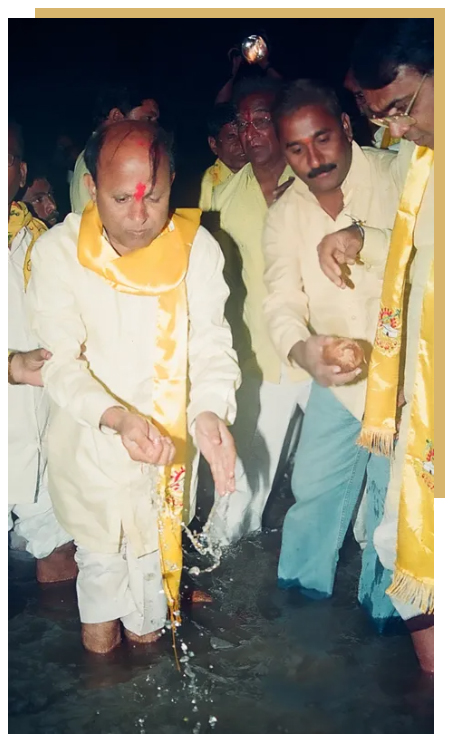
Raised peoples’ concerns
I was nominated to the Rajya Sabha in the year 2012. This enabled me to play an important role in the national political scenario. I consider my days as a Member of Rajya Sabha as very crucial phase of my life. On the floor of Rajya Sabha I emphatically put forth the need to create a separate Telangana State. Making use of the upper house as a forum, I explained to the countrymen the problems of Telangana region and the aspirations of the people of Telangana for the creation of a separate state. It gives me great satisfaction to state that my speech at the Rajya Sabha resulted in a national consensus on the Telangana issue. During my six year long tenure as an MP, I got in touch with several leaders of the national parties and also the leaders from regional parties. Many became my good friends. I used to discuss several national issues with them. Those friendly deliberations will remain etched in my mind as unforgettable memories.
I made the best of my contributions possible as a Member of Rajya Sabha to serve our Nation. I was a member in the crucial Parliamentary Committees on Defense, Railways, OBC, Ethics, Rural Development, Urban Development and other subjects. As a member of the Parliamentary committee I toured the nook and corner of the country and got the feel of the conditions prevailing across the country. I came to know the problems faced by the people in different regions. The Union government took into consideration some of the suggestions I made in the capacity of a member of the Parliamentary Committee on OBC. As an MP, I tried utmost to be of use to the Telugu people. As far as possible, I made efforts to get the people’s problems solved. I spent the MPLAD fund allotted to me on the people’s welfare and developmental works.
***
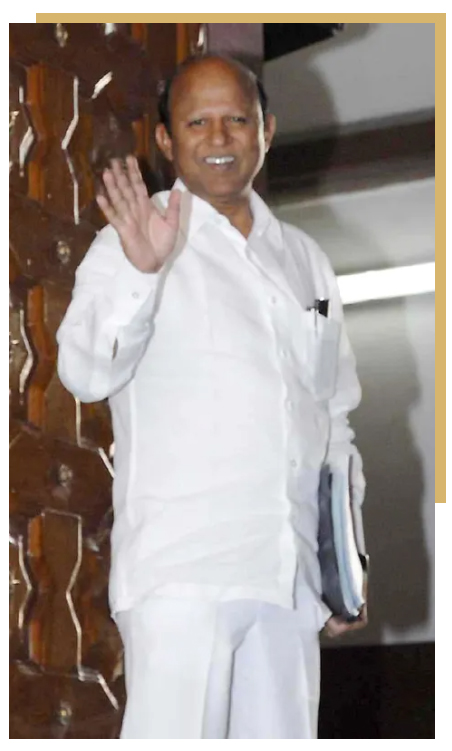
Thrived for internal democracy and social justice
Late Sri N.T. Rama Rao founded the Telugu Desam as a regional Party with lofty ideals. The party won people’s mandate and came to power within nine months of its formation. Ever-since then it has been playing crucial role in the State, regional and national politics. The party is guided by a constitution that has entrusted the politburo with the responsibility of steering the party in the right direction. Whether the party is in the government or in the Opposition, decisions are taken only after thorough deliberations at the politburo. It has been the party’s tradition to honor the opinion of all the politburo members before taking any decision. Entry into the politburo of a party comprising of thousands of leaders is no ordinary achievement. In the year 1992 I became the Telugu Desam Party’s politburo member.
Having entered the highest decision making body at a very young age, I fulfilled all the delegated responsibilities with sincerity. Particularly I made the best use of every opportunity to solve the problems of the poor and downtrodden sections. I did everything in my capacity to ensure equal justice to all in the party. I used to be explicitly vocal about the role to be played by the Telugu Desam in State and national level politics. I continued to be the party’s politburo member even after there was a change of guard in the party as Sri Nara Chandrababu Naidu became the party chief. Whenever the Telugu Desam party comes to power, the schemes to be designed to fulfill the party’s electoral promises are first discussed in the politburo. I never let go the responsibility in advising the party on designing schemes that extended maximum benefits to the poorest of the poor in the society. At times the party did not follow my advice, even in such cases I did not shirk the responsibility to voice my concerns.
The Telugu Desam Party’s annual conference of the party delegates and public representatives belonging to the party is called Mahanadu. This is a major forum for discussing party affairs and people’s problems. When the party is in power, Mahanadu passes resolutions on various issues and forwards them to the government. These resolutions are implemented as government policies. As a politburo member, I always took active part in this democratic process. I have been assisting the party chief in preparing draft resolutions on various subjects, introducing the resolution at the party forum and getting the resolution passed. I played a crucial role in the Telugu Desam party’s organizational matters. I did everything in my capacity to strengthen the party and to take it closer to the people.
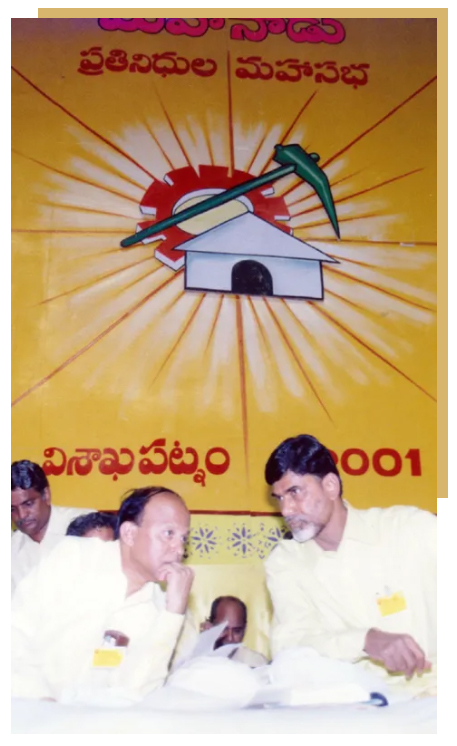
Rich experience of learning
During my prolonged political life, I got to tour several foreign countries. Apart from official trips, I also visited several countries in my personal capacity. People commonly visit places of historic significance and places with tourist significance during their foreign tours. However, right from my childhood I had the curiosity to learn about administrative systems of different countries along with their geographic and historic significance. I have read many books on empires that have crumbled in different parts of the World. I have also read how the military dictatorships came to an end the way the communist and socialist systems culminated. I always yearned to see those countries and interact with the people there. What a joy one feels when the opportunity to visit those countries emerge accidentally. During my official visits to foreign countries. I used to study the social and economic conditions prevalent in those countries and alsovisit the tourist spots on a learning mode.
As Home Minister I visited New York City in the US. Protection of law and order is a big challenge in New York, which is ever brimming with commercial activity. I learnt about the best policing practices being followed by the New York Police. I studied about the technology being utilized, the people’s participation and other aspects of policing. I spoke to the New York City’s police chief, who explained to me the challenges frequently faced by police the effective ways in which they meet the challenges. The prisons system of the US deserves to be specifically mentioned. Inorder to bring about transformation of heart among prisoners and to enable them to lead a respectful life after their release from jail, the government gives to them training in various vocations. I was impressed by the reformatory works done by the authorities there. During my visit to London, I studied the functioning of the British police and the Scotland Yard. As a minister I triedto adapt, them as far as possible, if not entirely, the best practices of the US and British police in my State also.
My visit to the People’s Republic of China deserves special mention. I led the delegation of Telugu Desam Party legislators that was officially invited to China in the year 2000, to study the political and economic conditions of that country. Today a great deal of information about the political situation in China is available. That was not the case in those days. China used to be a riddle that could be hardly understood by anyone in those days. China is a vast nation that attained freedom along with us. It also was bequeathed the legacy of poverty and unemployment.I always had curiosity to know as to how the country achieved its economic advancement. Without any assistance from other countries, how did the country develop its own technology and attain unimaginable progress in the fields of irrigation, agriculture and industry? How did the country attain its economic development? How did the country remain surging in progress and prosperity? How it became a super power in the World? During my 15 day tour in China I came across several astonishing happenings and episodes. The manner in which the people of the country work hard without ever wasting a single moment, their dedication to work, their patriotism and other aspects of life in China greatly impressed me. I visited several cities, including Beijing. I can never forget the emotional upsurge inside me during my visit to the Tiananmen Square where college students rose in revolt against the Government, seeking liberty from the totalitarianism. The Great Wall of China is simply a marvel indescribable. I visited the mausoleum of Chairman Mao and paid tributes to his embalmed body. My visit to China was truly unforgettable. I could learn much about China during my deliberations with the leaders of different stature.
When Hyderabad was chosen for hosting the National Games, the then Chief Minister Sri Chandrababu Naidu appointed me as the Chairman of the organizing committee. Asian Games were being conducted at the South Korean capital Seoul at that time. I was asked to visit Seoul to study the manner in which Asian Games were being conducted. My foreign tour included visit to Malaysia, Thailand, Singapore, HongKong, Japan and other countries to study the ways in which those countries organized sports events.
I toured across Europe in my own personal capacity. I toured almost all the European countries including England, France, Germany, Sweden, Netherlands and Belgium. With much fascination, I had studied about the French revolution that contributed a great deal towards the evolution of World Civilization. I felt great happiness to witness France and personally saw the country’s development.
During my stint as the State cabinet minister for ten long years, between 1994 and 2004, I got the opportunity to meet several foreign dignitaries. I had the good fortune of discussing many aspects with them all. The US President Bill Clinton, British Prime Minister Tony Blair, Chinese Premier, Singapore Prime Minister , the US vice president Al Gore were among the dignitaries that visited Hyderabad during my tenure as a minister.
Apart from foreign dignitaries, I also got the opportunity to meet several prominent national leaders. I also met experts in various fields, scholars, and intellectuals. This helped in enhancing my performance as a minister and my quality as a human being.
******
Social service
Soulful satisfaction
I derive great self satisfaction with social work. I have been keen on serving the society right from the beginning. We had to quit our native village Tukkuguda and settle in Hyderabad as there was no scope at the village to pursue education beyond 4th standard. I always wanted to shield the younger generations of my village from the travails that I and my family underwent. With that end in mind I launched a non-government voluntary organization called ‘Devendra Foundation’. Under the aegis of this foundation, we launched Devendra School at Tukkuguda village. The school has all the infrastructure facilities and it is being run successfully since the past ten years. Currently the school has 1450 students. A third of these students are being provided with free education along with books, clothes and scholarships. When I was Zilla Parishad Chairman, I donated 10 acres of my own land for the construction of government residential hostel. I strongly believe that education is the most potent antidote to poverty. It gives me great satisfaction that I contributed to the spread of education among thousands of students, by donating my land for the construction of residential Hostel.
****
Religion-Spirituality-Tranquillity
Confluence of Human values
Right from my student days I had keen interest in all religions. I studied the sacred scriptures of all religions. I got the opportunity to visit pilgrim centers located both within the country and outside. Beliefs, traditions and ways of prayer may vary, but the essence of all religions is the same. The one thing that I have experienced is this- religion means self knowledge. A state of absolute tranquillity. Every religion teaches code of righteousness to man. Love, compassion, generosity and truth lie at the bottom of the teachings of all religions. Religion teaches us to be tolerant, accommodative and cooperative towards fellow beings. This is the truth taught by the great saints of all religions.
Every religion is pure. Its scope is vast. Religions were impacted by the time and space in which they were born. Some people try to changed the form of religion because of their unbridled desires and unfounded fears and supremacist attitude. I have understood that religions, which should serve the humanity as spiritual nectar, is being misused by some for their own end. One can visualize all this by pondering over it with clear and stable mind.
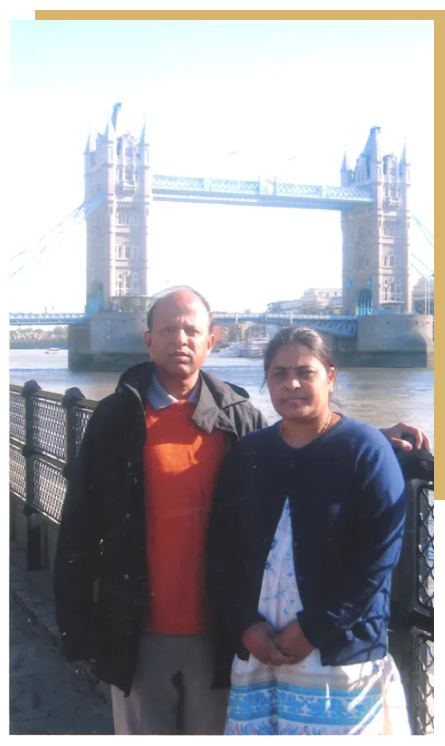
Writings
Social Wall
![]() Twitter
Twitter


